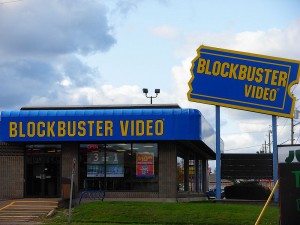Netflix is great and Blockbuster sucked is the simple reason why the latter had to file for Chapter 11. But why didn’t Blockbuster change its ways and use its capital to become a leaner and smoother operation? According to the New Yorker‘s James Surowiecki, it’s because large, successful companies tend to double down on their core strategies during times of stress, even when those strategies obviously no longer work. An excerpt:
“Why didn’t Blockbuster evolve more quickly? In part, it was because of what you could call the ‘internal constituency’ problem: the company was full of people who had been there when bricks-and-mortar stores were hugely profitable, and who couldn’t believe that those days were gone for good. Blockbuster treated its thousands of stores as if they were a protective moat, when in fact they were the business equivalent of the Maginot Line. The familiar sunk-cost fallacy made things worse. Myriad studies have shown that, once decision-makers invest in a project, they’re likely to keep doing so, because of the money already at stake. Rather than dramatically shrinking both the size and the number of its stores, Blockbuster just kept throwing good money after bad.”
Tags: James Surowiecki

